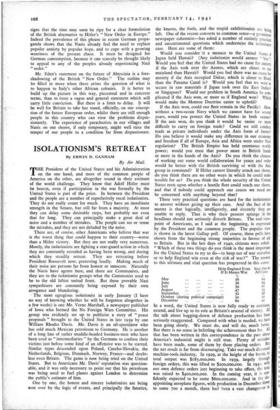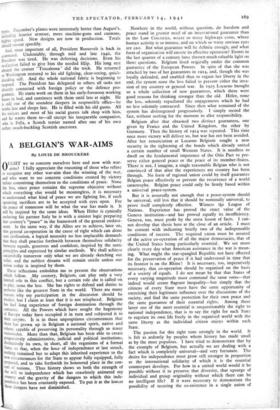ISOLATIONISM'S RETREAT
By ERWIN D. CANHAM
By Air Mail.
THE President of the United States and his Administration THE the one hand, and most of the common people of America on the other, are altogether sound in their estimate of the world challenge. They know that Adolf Hitler must be beaten, even if participation in the war formally by the United States is part of the price. In between the President and the people are a number of superlatively vocal isolationists. They do not really count for much. They have an inordinate strength in the Senate, but still far from a majority. At most they can delay some desirable steps, but probably not even that for long. They can principally make a great deal of noise and a number of mistakes. The people can see or sense the mistakes, and they are not deluded by the noise.
There are, of course, other Americans who believe that war is the worst thing that could happen to their country—worse than a Hitler victory. But they are not really very numerous. Mostly, the isolationists are fighting a rear-guard action in which they are constantly revealed as having been wrong, and during which they steadily retreat. They are retreating before President Roosevelt now, protesting loudly. Making much of their noise are persons far from honest or innocent. Naturally the Nazis have agents here, and there are Communists, and they are to the isolationist groups what the Communist used to be to the old leftist united front. But these provable Nazi sympathisers are constantly being exposed by their own arrogance and blundering.
• The most egregious isolationist in early January (I have no way of knowing whether he will be forgotten altogether in a few weeks) is one Mr. Verne Marshall, a newspaper publisher of Iowa who formed the No Foreign Wars Committee. His group was evidently set up to publicise a story of " peace proposals " brought to the United States in late 1939 by one William Rhodes Davis. Mr. Davis is an oil-speculator who has sold much Mexican petroleum to Germany. He is another of a long line of rather muddle-headed business-men who have been used as " intermediaries " by the Germans to confuse their victims just before some kind of an offensive was to be started. Similar types descended upon Poland, Czecho-Slovakia, the Netherlands, Belgium, Denmark, Norway, France—and doubt- less even Britain. The game is now being tried on the United States. But to Americans Mr. Davis' reputation was question- able, and it was only necessary to point out that his petroleum was being used to fuel planes against London to determine the public's estimate of him.
One by one, the honest and sincere isolationists are being won over by the logic of events, and principally the fanatics, Japan held Hawaii? (Any isolationist would answer " Yes.") Would you feel that the United States had no cause for anxiety if the Axis took over the Azores, which are closer to our mainland than Hawaii? Would you feel there was no cause for anxiety if the Axis occupied Dakar, which is closer to Brazil than the Panama Canal is? Would you feel that we were as secure in raw materials if Japan took over the East Indies? or Singapore? Would our problem in South America be com- plicated if the Axis won, or more so if England won? Which would make the Monroe Doctrine easier to uphold?
If the Axis won, could our fleet remain in the Pacific? How, without a two-ocean Navy which we cannot have for several years, would you protect the United States in both oceans? If the axis won, do you think it would be easier or more difficult to carry on foreign trade? Could we still conduct trade as private individuals under the Axis form of barter? Do you believe it would make any difference in our economy and freedom if all of Europe, Asia and Africa were under Nazi regulation? The British Empire has held enormous world- power; would you trust that power more in British hands or more in the hands of the Axis? Do you think the chances of working out some world collaboration for peace and order would be better with the British surviving or with the Axis group in command? If Hitler cannot literally attack our shores, do you think there are no other ways in which he could make trouble for us? Do you think the whole security of the United States rests upon whether a hostile fleet could reach our shores, and that if nobody could approach our coasts we need not be concerned with anything beyond that?
These very practical questions are hard for the isolationists to answer without giving up their case. And the fact of the matter is that logically, intelligently, and decently they are unable to reply. That is why their present splurge in the headlines should not seriously disturb Britons. The real view- point of Americans, as I said at the beginning, is expressed by the President and the common people. The popular view is shown in the latest Gallup poll. Of course, these polls have shown from the beginning strong majorities in favour of aid to Britain. But in the last days of 194o, citizens were asked: " Which of these two things do you think is the most important for the United States to try to do—to keep out of war ourselves or to help England win even at the risk of war?" The answer to this ultimate and vital question has progressed in this curve:
Help England Even If It Means War Stay Out At All Costs May 36 64 June 36 64 July 39 6r August 47 53 September ... 52 48 October (during political campaign) 5o 5o December 6o
40 In a word, the United States is now fully ready to continue, extend, and live up to its role as Britain's arsenal of victory. All the talk about bogging-down of defence production has been seriously exaggerated. Compared with what is needed, we have been going slowly. We must do, and will do, much better. But there is no sense in belittling the achievement thus far. All that has been written in this correspondence in the past about America's industrial might is still true. Plenty of mistakes have been made, some of them by those placing orders. But the net result is far from discouraging. Take our much discussed machine-tools .industry, In 1929, at the height of the boom, Its total output was $r85,000,000. In 1939, largely through foreign orders, this was lifted to $200,000,000. In 1940, our own defence orders just beginning to take effect, the touu was raised to $400,000,000. In the coming year, it is CUD' fidently expected to be some $600,000,000. And in the dis- appointing aeroplane figures, with production in December down to some 70o a month, there had been a vast changeover in the knaves, the fools, and the stupid exhibitionists are being left. One of the recent converts to common sense—a prominent newspaper columnist—has asked a number of entirely practical and unsentimental questions which undermine the isolationist case. Here are some of them: Would you consider 'it a menace to the United States if types. December's planes were immensely better than August's. including heavier armour, more machine-guns and cannons, higher speed. New designs are now in production. Totals should mount speedily.
And, most important of all, President Roosevelt is back in command. Undeniably, through mid and late 1940, the President was tired. He was deferring decisions. Even his re-election failed to give him the needed fillip. His long rest aboard the cruiser Tuscaloosa ' did the trick. He returned to Washington restored to his old fighting, clear-seeing, quick- deciding self. And the whole national fabric is beginning to respond. The President has delegated to others all tasks not directly connected with foreign policy or the defence pro- gramme. He starts work on them in his early-forenoon working hours in bed, and continues with them until late at night. He is still one of the soundest sleepers in responsible office—he works late and sleeps late. He is filled with his old gusto. All his visitors and most of his social guests talk shop with him, and he wants them to—all except his inseparable companion, who is Falla, a Scotch terrier named after one of his own rather swash-buckling Scottish ancestors.































 Previous page
Previous page